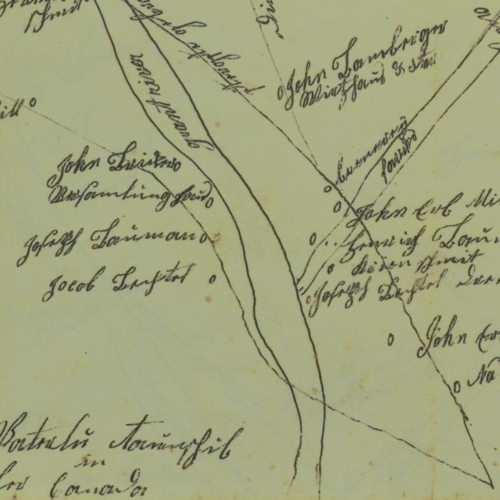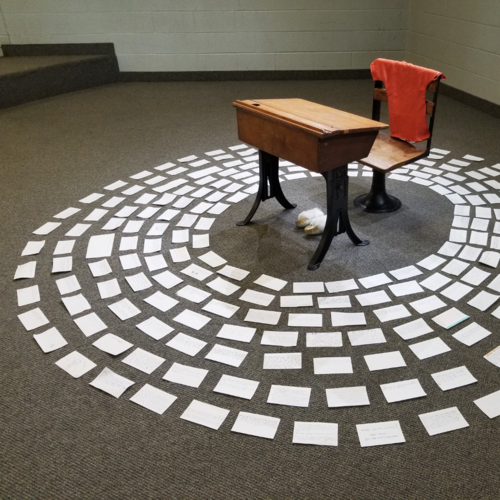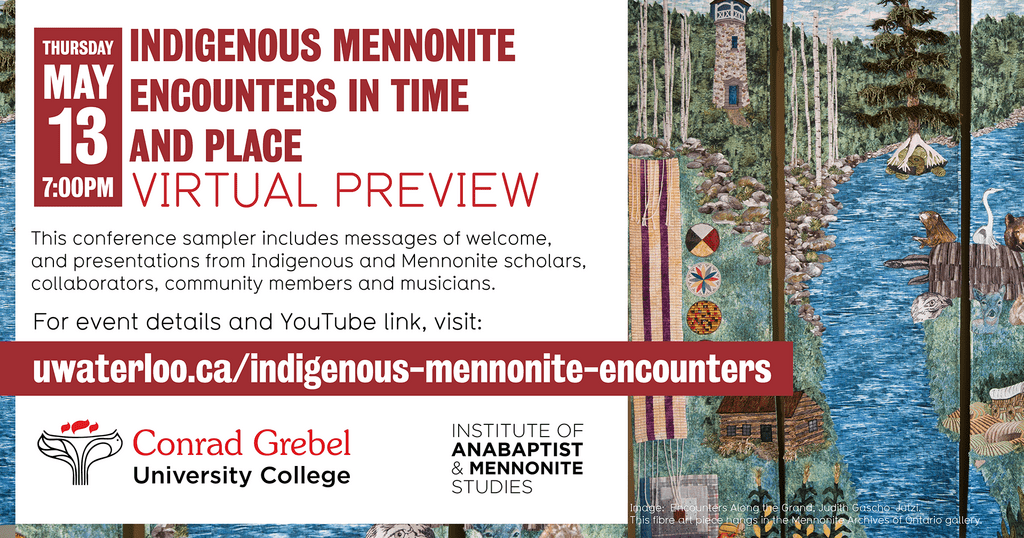A Gathering of Body, Mind, and Spirit | May 12-15, 2022
This academic conference and community education event offered stories and analyses of encounters and relationships between Indigenous peoples and Mennonite settlers from point of contact to the present.
The intent was to advance understanding on the part of Mennonites and other interested participants of their colonial histories, and to advance reconciliation and bring justice to Indigenous-settler relations. The event comprised academic presentations, community storytelling, artistic offerings, and both Indigenous and Mennonite ceremony in a time of listening, conversation, and silence. Selected papers will be published in a future issue of the Journal of Mennonite Studies.
Land Acknowledgement
Conrad Grebel University College is situated on the traditional territory of the Attawandaron (Neutral), Anishinaabeg and Haudenosaunee peoples. The College, and the University of Waterloo, was built on the Haldimand Tract, the land granted in 1784 to the Six Nations that includes 10 kilometres on each side of the Grand River from its source in Dundalk to its mouth at Lake Erie.
Read Conrad Grebel University College's full land acknowledgement
About the Event
This description is a direct copy of the original description provided to event participants.
“Indigenous-Mennonite Encounters in Time and Place,” an academic conference and community education event, will offer stories and analyses of encounters and relationships between Indigenous peoples and Mennonite settlers from point of contact through to the present. A virtual preview was created to mark the original conference date of May 2021.
In October 2000, the “History of Aboriginal-Mennonite Relations Conference” was held at the University of Winnipeg; conference proceedings were published in the Journal of Mennonite Studies in 2001. Nearly two decades have passed since this event, and much has happened in Indigenous-settler relations: the Truth and Reconciliation Commission brought awareness of the impact of residential schools; the Idle No More movement raised environmental concerns; the Sixties Scoop was identified as part of the current child welfare system; and efforts towards Indigenization in post-secondary institutions began, to name a few. Mennonite organizations, churches, and individuals are working to establish new relationships with Indigenous communities, reconsider their settler narratives, and assess their roles in past injustices.
The intent of this event is to advance understanding, on the part of Mennonites and other interested participants, of their colonial histories, and is an effort to advance reconciliation and bring justice to Indigenous-settler relations. The event will comprise academic presentations, community storytelling, artistic offerings, and both Indigenous and Mennonite ceremony. The organizers anticipate an event full of listening, hearing, conversation, and silence.
Selected papers will be published in the Journal of Mennonite Studies. The Journal has priority of publication for presentations stemming from the conference. Invitations to submit will be sent out shortly after the conference concludes.
The gathering will take place at Conrad Grebel University College, situated on the Haldimand Tract, granted by proclamation to the Haudenosaunee / Six Nations in 1784 as land protected from settlement, in order to ensure the maintenance of their way of life. It is also the traditional territory of the Attawandaron, Huron-Wendat, and Anishinaabeg Peoples. Mennonites were the first European settlers on Block No. 2 of the Tract (now the cities of Waterloo, Kitchener, and part of Cambridge), arriving in the early 19th century. Nearby is the Niagara Peninsula, where Mennonites first settled in Canada, and Six Nations of the Grand River, the largest First Nations reserve in Canada. The topics to be explored, however, will also be international, given that Mennonites have a long migratory history that saw them settle in many parts of the world over the past three centuries, during which they encountered Indigenous peoples across the globe.
Planning Committee
- Christy Anderson (PhD student University of Saskatchewan) is Anishinaabekwe from Pinaymootang First Nation in Treaty Two Territory and of Mennonite settler descent.
- Lori Campbell Lori Campbell is Two-Spirit nēhiýaw āpihtāwikosisān and is a band member of Montreal Lake First Nation, Treaty 6 territory. She is Associate Vice-President, Indigenous Engagement at University of Regina.
- Kelly Fran Davis is Haudenosaunee/Six Nations from the Grand River Territory, Cayuga Nation, Wolf Clan.
- Marlene Epp is Professor of History and Peace & Conflict Studies at Conrad Grebel University College and has Russian Mennonite ancestry.
- Laureen Harder-Gissing is Archivist-Librarian at Conrad Grebel University College and is descended from Russian Mennonite immigrants.
- Emma Martin is a co-op undergraduate student with Swiss Mennonite ancestry, and is studying Psychology with Indigenous Studies and Peace and Conflict Studies minors at the University of Waterloo.
- David Neufeld is Visiting Assistant Professor of History at Conrad Grebel University College.
- Reina Neufeldt is Chair, Associate Professor of Peace & Conflict Studies, Conrad Grebel University College. Her Russian Mennonite family settled in Treaty One and Treaty Six territory.
- Karen Sunabacka is Associate Professor of Music at Conrad Grebel University College. She grew up in Treaty 1 Territory and has Métis and mixed European heritage.
Planning Committee Statement on Personal Claims of Indigenous Identity
Our planning committee, collectively a mixed identity group of Indigenous and settler peoples, share an ongoing concern about fraudulent claims to Indigenous ancestry in academia. We recognize that Indigenous identities are complex and have been impacted by settler colonial invasion in Indigenous territories. We are ever mindful of Indigenous nationhood and the inherent sovereignty of the many nations across this land, and their right to determine who belongs to their communities. As universities evolve in their consultations with Indigenous peoples about identity and nationhood, so too will our means of identity recognition shift. Under the guidance of our Indigenous committee members, we respectfully denounce any claim of Indigenous identity that is not grounded in acceptance by a given community as their member, registration with a nation or through a band, or some other legitimate form of historical continuity that predates settler colonialism. Misidentification is harmful to reconciliation efforts and is considered an affront to many Indigenous nations, as well as to individual Indigenous peoples.
We request that all of our conference participants self-identify and recognize the Indigenous territory they call ‘home’ in their introductions.
Sponsors
- The Institute of Anabaptist and Mennonite Studies at Conrad Grebel University College
- The Mennonite Historical Society of Canada through its “Divergent Voices of Canadian Mennonites" project
- The Waterloo Indigenous Student Centre
We gratefully acknowledge the funding provided by:
- Academic Development and Research Fund, Conrad Grebel University College
- Alvin and Doris Jantzi
- Byron and Ann Weber Becker
- D. F. Plett Historical Research Foundation
- Jim Bender Sonya Schwartzentruber
- J. Winfield Fretz Endowment in Mennonite Studies, Conrad Grebel University College
- Jim Tiessen and Karen Thiessen
- John and Arlene Groh
- Linda and Phil Ruby
- Maise Sum and Dawa Suparta
- Marpeck Fund
- Mennonite Central Committee Canada (funders of the Divergent Voices of Canadian Mennonites project)
- Mennonite Historical Society of Ontario
- Redekop Family Endowment
- Stirling Avenue Mennonite Church
- Waterloo North Mennonite Church
Concert Partners
We gratefully acknowledge funding by Menno S. Martin, Josselin Insurance, Eby Financial, and Leis Pet Distributing INC. as Concert Partners
Keynote presentation
Session Speakers
- Phil Monture, Tanya Hill-Montour, and Gary Warrick "Six Miles Deep: Histories of Archaeology and Settlement in the Grand River Territories of the Haudenosaunee"
- Tala Bautista, “Understanding the Mennonites through an Indigenous Worldview”
- Derek Suderman, “Treaty and Covenant: Exploring Resonance between Haudenosaunee and Old Testament Perspectives on Land and Peoplehood”
- Reina Neufeldt, “Mennonites as Implicated Subjects in Treaty 1 Territory
- Kimberly D. Schmidt, "Gender and Mennonite Missionary Photographs of the Cheyenne and Arapaho, 1880-1940"
- Joseph Wiebe, "Mennonite Environmentalism and Settler-colonialism: Ethics, History, and Indigenous Relations"
- Aileen Friesen, "Mennonite and Settler Colonialism in Dagestan"
- Hannes Kalisch, "Salvation? Conversion as Part of the Colonial Process"
- Ben Nobbs-Thiessen, "Indigenous Peoples, Mennonites, and the State in Latin America: From 20th Century Revolutionary Nationalism to 21st Century Autonomy Movements"
- Rosalind Beiler and Zachary Stoltzfus, “Rethinking the ‘Hochstetler Massacre': Lenapes and Amish as Refugees"
- Victoria Lumax, "Peace Language in Institutional, Colonial Contexts: A Deconstructionist Analysis of Centre for Peace Advancement Texts in Light of Reconciliation”
- Janna Martin, “This Land is Ours: Towards an Understanding of Mennonite and Amish Settler Colonial Myths”
- Sarina Simmons, “Knots on a String: Relationality and Identity in Mennonite-Indigenous Encounters
- Clarence Cachagee and Seth Ratzlaff, "Sharing and Writing Clarence's Story"
- Esther Epp-Tiessen, "Whose Home? Who's Home? One Congregation's Indigenous-Mennonite Encounter"
- Sandra Krahn, "The Impact of Settler and Indigenous Relationships on Metis Family Identities"
- Laureen Harder-Gissing,'What was Lost, What Remains, What is Possible': Attempting Truth and Reconciliation in a Mennonite Archives"
- Jason Kauffman, “Sources for Indigenous-Mennonite History at the Mennonite Church USA Archives"
- Isabel Klassen-Marshall, “Promised Peoples on Promised Lands: Mennonite and Métis Land Relations and Property Law in Southern Manitoba"
- John Thiesen, "Reflections on Digital Repatriation: The Hopi Photos of H. R. Voth"
- Jeremy Bergen, “Mennonite Dispossession of Indigenous Lands as a Crisis for Mennonite Identity”
- Melanie Kampen, “The Spectre of Reconciliation: Indian Residential Schools in Canada and the Limits of Mennonite Peace Theology”
- Wendy Kroeker and Christy Anderson, “Decolonizing Education in Christian Spaces: A Messy Journey to Making Authentic Reconciliation a Reality”
- Kelly Fran Davis and Stephen Svenson “Experiencing Reconciliation”
Special Features
kȃ-nîmihitocik: They Who Are Dancing
Featuring Cellist and Composer Cris Derksen and the Andromeda Trio and premiering works by Cris Derksen and Karen Sunabacka.
The concert featured Derksen’s premiere of a composition for choir titled kȃ-nîmihitocik: They Who Are Dancing, commissioned by Conrad Grebel University College with support from the Henry A. and Anna Schultz Memorial Fund. The choir was conducted by Dr. Mark Vuorinen, Associate Professor and Chair of the Music Department at Conrad Grebel.
Healing Haunted Histories: Decolonizing Discipleship (online workshop)
Elaine Enns and Ched Myers, authors of Healing Haunted Histories: A Settler Discipleship of Decolonization (Cascade, 2021) along with former Chief Harry Lafond of Muskeg Lake First Nation, Saskatchewan, lead an interactive workshop exploring how Canadian landscapes and narratives are “haunted” by Indigenous genocide and other historic and continuing social injustices.
Haudenosaunee Voices Educational & Inspiring Performance
Featuring Master of Ceremony, Heyo: te’dok a.k.a Kelly Fran Davis
Ceremonial Fire Ground
A fire was lit at the ceremonial fire grounds on Friday, May 13 and Saturday May 14, 7:30 AM - 6:00 PM and Sunday, May 15 from 7:00 - 8:30 AM Led by Firekeeper Al McDonald. Thank you to Shatitsirótha’: Waterloo Indigenous Student Centre for sharing this sacred space.
Walk to REDRESS and Brubacher House
A walk through the University of Waterloo campus, with a viewing the REDress project, an outdoor exhibit created to mark the National Day of Awareness for Missing and Murdered Indigenous Women, Girls, and Two-Spirited people in Canada by artist Jamie Black. The walk continued on to Brubacher House Museum, a restored 1850s Pennsylvania German Mennonite farmhouse and four square garden.
Art and Exhibits
On the Land
On the Land, by Bangishimo. Outdoor pathway behind the Great Hall.

Bangishimo is an IndigiQueer Anishinaabe photographer originally from Couchiching First Nations. They are a community organizer for Idle No More and co-founder of O:se Kenhionhata:tie, also known as Land Back Camp.
On the Land is a portrait series answers the question “What does it mean or what has it meant to live on this Indigenous territory?” In this pandemic era, many of us are trying to find a place where we feel safe and belong. Now is the time to reflect and ask yourself this question.
Sponsored by Stirling Avenue Mennonite Church - Missions, Peace & Justice Ministry and Waterloo North Mennonite Church
Against the Grain: Mennonite Archives, Indigenous Histories

Archival Exhibit. Mennonite Archives of Ontario Gallery and Milton Good Library, 3rd Floor at Conrad Grebel.
Map (detail) from 1818 of early Mennonite settlement of Kitchener, including Mill Street which followed an established Mississauga route.
Brush a piece of napped fabric against the grain and contrasting colours and patterns appear.
Historians read documents against the grain to make visible multiple and diverse experiences of the past. Reading against the grain is one way to uncover hidden Indigenous histories and colonial legacies.
Curated by Archivist Laureen Harder-Gissing, this exhibit features documents from the Mennonite Archives of Ontario that invite viewers to practice reading histories of Indigenous and Mennonite encounter against the grain.
Sitting With the Truth
Milton Good Library, 3rd Floor at Conrad Grebel.

Photo credit: Sara Wahl
A participatory exhibit that invites you on a journey around an old desk and chair, taking in stories from survivors of Mennonite-run residential schools in Treaty 9. Sponsored by Mennonite Central Committee’s Indigenous Neighbours Program.
River Cycle
River Cycle,by Meg Harder. Milton Good Library, 3rd Floor at Conrad Grebel.

River Cycle, Installation View, 2018, gouache and ink on paper, 230 in x 30 in.
Photo by Robert McNair. Courtesy of the Kitchener-Waterloo Art Gallery
Meghan Harder makes art in the form of drawing, writing, sound, sculpture and installation to explore.
To make "River Cycle," she appropriated the aesthetic sensibilities of traditional Mennonite fraktur art to illustrate a circular narrative inspired by the biblical flood myth. Her retelling incorporates fragments of local history, architecture, and bioregional references alongside fantastical creatures and events.
Landed Buggy
Landed Buggy, August Swinson, Arnold Jacobs, and Jeanette Seiling, Conrad Grebel main entrance

Landed Buggy is an artistic land acknowledgement. On the back of the buggy, fraktur artwork evokes a Swiss Mennonite heritage. The sides of the buggy represent two people groups (Anishinaabeg, Haudenosaunee) who were already on the land in Waterloo Region in the early 1800s, at the time of contact. The mirror at the front invites viewers to see themselves on the land, to ponder their own connections to Original Peoples and land and imagine a better future. Curated by Rebecca Seiling, MCCO Indigenous Neighbours.
Photo credit: Rebecca Seiling
Encounters Along the Grand
Encounters Along the Grand, fibre art by Judy Gascho-Jutzi, Mennonite Archives of Ontario Gallery, 3rd Floor.

This pictorial slice of history depicts the early contact between Mennonite settlers and Indigenous peoples along the Grand River.
Commissioned by the Mennonite Historical Society of Ontario, this quilt hung in several church and community locations around Waterloo Region before its installation at Conrad Grebel University College in 2014.
